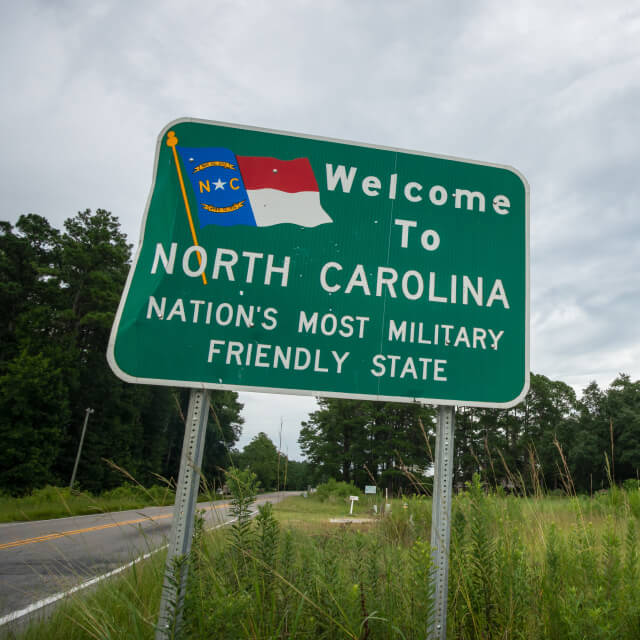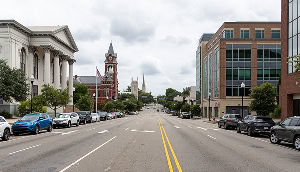North Carolina is one of the most versatile states in the country. Boasting some of the country’s top nature reserves in the Great Smoky Mountains National Park with more than 12 million visitors a year, the state is also home to the majestic 439-mile Blue Ridge Parkway, 200 miles of barrier islands and beaches, and the town of Banner Elk, known for its world-class ski resorts.
All drivers are required to have car insurance in North Carolina. All insurance companies run a real-time database of active and lapsed coverage, passing the information onto the state. Many factors help determine your rates, including your age, claims history, zip code of residence, and participation in good driver and loyalty programs.
Quick Facts
- According to the NCDOT Annual Crash Facts Report, there was a total of 247,214 traffic crashes in 2020. Fatal crashes totaled 1,523 and 1,658 people were killed.
- The average cost of full coverage car insurance in North Carolina is $1,957 per year.
How Much Is Car Insurance in North Carolina?
The average cost of full coverage car insurance in North Carolina is $1,957 per year, which is much lower than the U.S. national average of $2,678.
Even a single accident could cause your car insurance premiums to go up as much as 350%. Remember, your geographical location plays a role. The higher the number of claims, thefts, and other incidents within your geographic area, the higher the rates for each resident.
What Is the Average Premium in North Carolina for Full Coverage Car Insurance?
North Carolina drivers pay an average premium of $163 a month for full coverage insurance. The price of premiums paid for car insurance depends on several factors, including age, claims history, participation in safe driving programs (e.g., defensive driving courses), and safe driving behaviors (e.g., driving less than 7,500 miles a year and installing anti-lock brakes).
Full coverage car insurance is generally divided into three types: comprehensive, collision, and bodily injury. Comprehensive liability covers damages due to theft, vandalism, extreme weather, and other non-collision-related factors. Collision liability pays for damages caused by a collision with another vehicle, such as a fender bender, or another object. Lastly, bodily injury liability covers medical bills for injuries and deaths.
We highly recommend increasing liability limits and reducing deductibles (e.g., to $500 from $1,000 or more). In exchange for a little extra paid per month, drivers can enjoy peace of mind knowing an accident is likely to result in little or no out-of-pocket expenses.
How Much Is It for Just the Minimum Required Car Insurance in North Carolina?
The average cost of North Carolina’s minimum required insurance is $49 a month. This will pay for the other driver’s costs if you are at fault in an accident – up to your policy limits. In many cases, that means there will be outstanding bills you will be required to pay – for the other driver and not to mention your own damages and injuries.
How Do Rates Compare Across Major Cities in North Carolina?
In North Carolina, rates vary from city to city. Drivers in less populated, more rural areas may not pay as much as drivers in congested cities.
Here is a comparison of car insurance rates by cities and zip codes in North Carolina.
| City (Zip)/Population | Average Monthly Full Coverage/Minimum Car Insurance Rate |
|---|---|
| Cary (27511)/45,130 | $107/$38 |
| Wilmington (28403)/30,334 | $114/$41 |
| East Flat Rock (28726)/3,021 | $104/$31 |
| Pineville (28134)/7,501 | $128/$46 |
| Hendersonville (28791)/12,430 | $104/$31 |
Unless otherwise specified, we use the following methodology to arrive at our average cost: male, age 30, lowest possible legal coverage allowed by state. Your rates will be determined by several factors, including your age, your gender and the amount of coverage you want to purchase.
Are There Good Driver Discounts in North Carolina?
North Carolina drivers are eligible for all kinds of discounts.
Discounts offered in North Carolina run across different categories. These include affiliation (e.g., alumni of a university), car-related (e.g., passive restraint), driver history, customer loyalty, policy (e.g., paid in full, enrolling in paperless billing), and personal traits, such as being a senior, homeowner, or student. Even signing up for defensive driving courses can be helpful.
Remember, the cleaner your driving record, the more likely you will be able to benefit from discounts.
Getting a Free Auto Insurance quote with Freeway is easy!
North Carolina Car Insurance Laws
North Carolina car insurance laws are very strong. Insurance companies are required to let the state know when an insurance policy is bought, cancelled or lapses. Based on the circumstances, the state may decide to impose fines and suspend your license and registration until proof of insurance is provided.
What Are the Mandatory Car Insurance Requirements in North Carolina?
North Carolina is an at-fault state. This means the person determined to be at fault for an accident is expected to pay for all medical bills and property damage, even above insurance policy limits.
Here are the state minimum liability coverage requirements for North Carolina:
- Bodily Injury Coverage per Person: $30,000
- Bodily Injury Coverage per Accident: $60,000
- Property Damage per Accident: $25,000
All North Carolina drivers need to provide proof of insurance to register a vehicle. Leased vehicle drivers should also learn of any mandated minimum liability requirements from the lenders or finance company.
What Is the Penalty for Driving Without Insurance in North Carolina?
The penalties for driving without insurance in North Carolina are pretty steep. For starters, expect to be served with a Class 1 misdemeanor and pay fines up to $50 for first-time offenses and higher fines for subsequent offenses. After a second offense, the fee goes up to $100 and comes with a restoration fee of $50. Subsequent offenses cost $150 in fees and $50 in restoration. Failure to pay penalties could result in license plate revocation.
Any jail time and suspended licenses can be avoided by paying civil penalties and providing proof of insurance within 10 days of receiving your notice.
North Carolina is one of six states that do not require SR-22 insurance to prove financial responsibility. However, drivers should expect their premiums to rise significantly with no significant drops for three years.
Remember, driving without insurance in North Carolina can also open you up to additional unforeseen legal costs and expenses, such as renting a car or taking public transportation.
What Factors Does North Carolina Law Allow in Determining Your Premiums?
In North Carolina, factors that help determine your rates include but are not limited to your driving record, zip code, address, and age.
North Carolina drivers can save on car insurance by driving an older make and model vehicle, opting for higher deductibles, lowering liability limits, and participating in safe driver programs such as defensive driving courses from an accredited school, installing anti-theft devices, or installing anti-lock brakes.
Remember, keeping your account in good standing with no record of claims for three to five years with the same insurer is your best bet to lower premiums.
Am I Required to Report an Accident in North Carolina to Authorities?
All North Carolina drivers are required to report car accidents to the North Carolina Highway Patrol or county sheriff’s office if they result in injury, death, or at least $1,000 in property damages.
If the police do not end up filing a report, North Carolina asks that you produce a written report within 24 hours of the accident to provide to the North Carolina Division of Motor Vehicles. Reports must explicitly state the cause for the crash, road conditions, all involved parties, and insurance information for the person determined to be at fault for the accident.
Find an office near you to help with your auto insurance
What Is Driving Like in North Carolina?
How Many Car Accidents Happen in North Carolina?
According to the NCDOT Annual Crash Facts Report, there were 247,214 traffic crashes in 2020. Of these crashes, alcohol played a role in 11,475 of them. Fatal crashes totaled 1,523 and 1,658 people were killed. Twenty-five percent of fatalities were related to speeding. In 412 fatal crashes, alcohol played a role. Of the fatalities, 545 people were not wearing a seatbelt.
How Many Uninsured/Underinsured Motorists Are in North Carolina?
According to the Insurance Information Institute (2019), 7.4% of North Carolina drivers are estimated to be uninsured, falling just outside of the top 10 states. Leading the way for the lowest percentage of uninsured drivers is New Jersey (3.1%) with the highest percentage of uninsured drivers belonging to Mississippi (29.4%).
Expect harsh penalties if caught driving without insurance in North Carolina, starting with being served a Class 1 misdemeanor. First offense fines of up to $50 on top of possible jail time or probation are possible. Subsequent offenses are subject to even higher penalties.
Remember, your insurance company will contact the state DMV if coverage is canceled or lapses. All police officers or traffic personnel will ask for proof of insurance at every traffic stop, so it is important to remain covered at all times.
FAQs about North Carolina Car Insurance
I Am a Low-Income Driver. What Can I Do About Getting Car Insurance in North Carolina?
There are many ways low-income drivers can qualify for discounted or lower-cost car insurance. One way is to apply for state minimum liability, which is $30,000 bodily injury coverage per person, $60,000 bodily injury coverage per accident, and $25,000 property damage per accident.
Another way is to drive an older vehicle, which is cheaper for insurers to cover.
A final way for low-income drivers to benefit from cheap car insurance is our favorite recommendation of all. Maintain a clean driving record and remain in good standing for three to five years with the same insurer. Many opt-in discounts are also available (e.g., enrolling in autopay, signing up for defensive driving courses, and applying for multi-line policies combining homeowners with auto).
Can an Undocumented Worker Get Car Insurance in North Carolina?
As of this writing, undocumented workers cannot get car insurance in North Carolina. However, there is ongoing proposed legislation that has advocated for those without legal status to obtain a driver’s license with restrictions in place.
If undocumented, we highly recommend beginning the process of becoming legal residents to obtain car insurance.
Is It Possible to Get Car Insurance in North Carolina With a DUI Mark on My Record?
North Carolina drivers with a DUI on record are eligible for car insurance. However, expect your annual car insurance rate to skyrocket by as much as 358%. In addition, drivers can expect to see premiums rise for up to three years, on top of a suspended license and reinstatement fees.
Unlike other states, North Carolina does not require drivers to file an SR-22, demonstrating proof of financial responsibility. However, they will be required to pay higher premiums for DUI insurance.
Removing a DUI from your record involves remaining in good standing for three years. If a second offense is committed within a three-year look-back period (as of the date of your first offense), then drivers can expect higher fines and possible jail time.
Get a North Carolina Cheap Auto Insurance Quote Today!

Freeway Insurance can help North Carolina drivers find the right coverage.
We highly recommend purchasing full coverage over state minimums for greater peace of mind while driving.
To learn more about car insurance, request a quote online, visit us at a North Carolina office near you, or call (800) 777-5620 for a free, no-obligation quote from one of our friendly agents.








